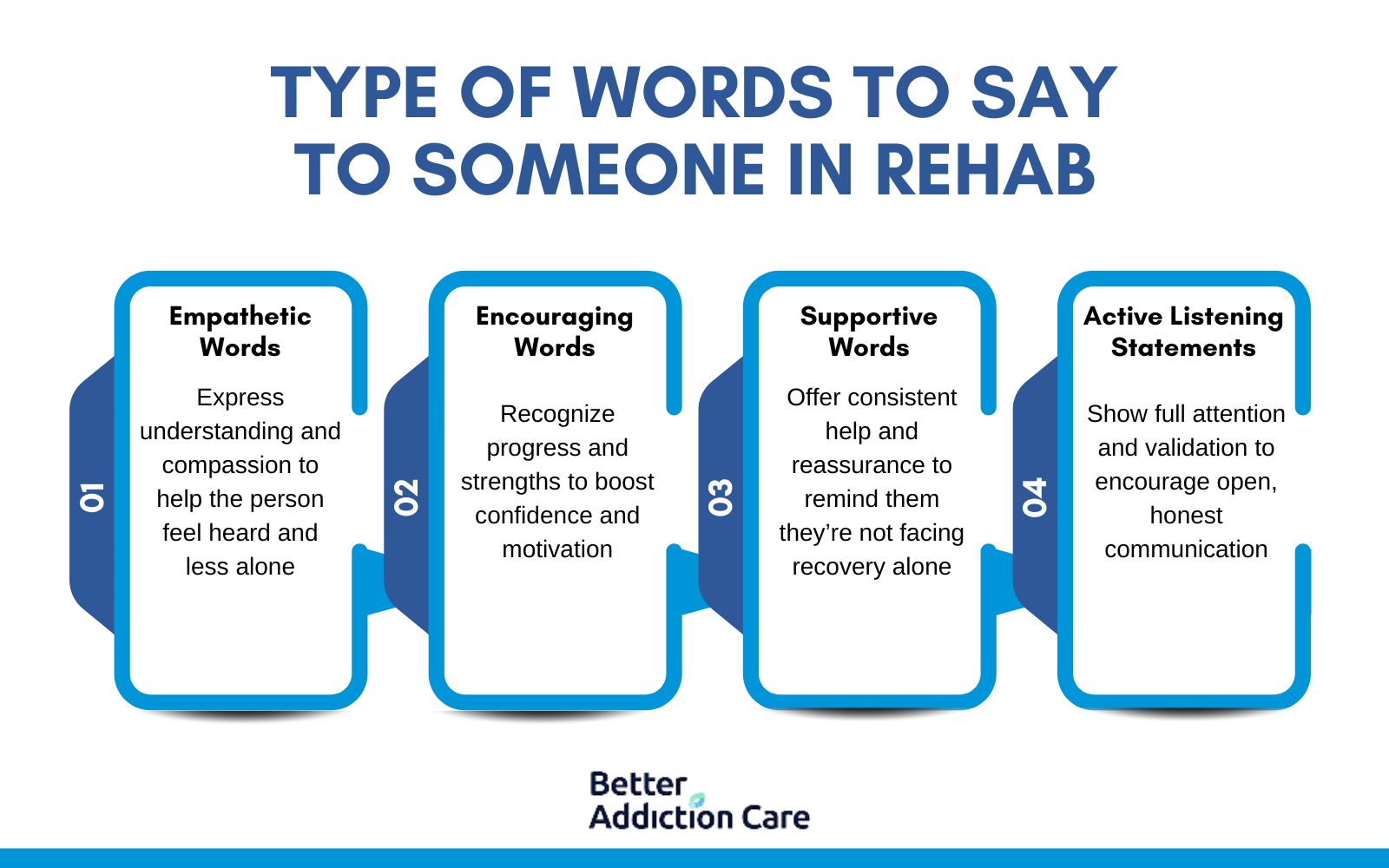What to Say to Someone in Rehab?
When speaking to someone in rehab, focus on expressing empathy, offering encouragement, providing support, and practicing active listening. Effective communication with individuals in rehabilitation requires compassionate, nonjudgmental language that validates their feelings and experiences.

Relationships and communication with family are critical factors in opioid addiction recovery. According to Flynn, P. M.’s 2003 study, ‘Recovery from opioid addiction in DATOS’, Among the 28% of opioid addiction patients who achieved recovery at the 5-year mark, family support was identified as one of the five primary factors contributing to their success, along with personal motivation, treatment experiences, religion/spirituality, and job/career.
Empathetic statements acknowledge struggles and remind them they're not alone. Recognizing progress boosts confidence and motivation. Active listening creates a safe space, reducing isolation. These approaches foster trust, strengthen relationships, and enhance mental health and recovery success.
What Type Of Words To Say To Someone In Rehab?

Empathetic words, encouraging words, supportive words, and active listening statements are the types of words to say to someone in rehab.
Empathetic words acknowledge the person's feelings and struggles without judgment, helping them feel understood and less alone. Encouraging words highlight their progress and strengths, boosting their motivation to continue recovery. Supportive words reassure them that they have a reliable network and aren't facing challenges alone. Active listening statements show you're fully engaged with what they're sharing, creating a safe space for them to express deeper thoughts and feelings, which is crucial for their long-term recovery and personal growth.
Words of Empathy
Empathy involves understanding and respecting a person's feelings and experiences. It shows genuine compassion by appreciating their worries without judgment, recognizing their struggles, and expressing care for their well-being. When you acknowledge how they feel and what they've been through, it helps them feel less alone and more understood.
Kind words greatly boost mental health and confidence during recovery. Many in treatment face anxiety, embarrassment, and guilt. Demonstrating understanding makes their problems feel normal, encouraging open discussion and fostering a supportive environment. This approach also enhances self-esteem and motivates continued therapy
Here are some examples of empathetic statements that are spoken to someone going to rehab and how they help:
Words of Encouragement
Encouraging words acknowledge a person's accomplishments, inspiring them to value their efforts and strengths, no matter how small. Recognizing their achievements and dedication lifts their spirits and motivates continued progress in recovery.
Such words boost self-confidence, helping individuals overcome obstacles and pursue goals with determination. Support fosters optimism, which is essential for navigating rehabilitation challenges. When someone receives words of encouragement, it provides immediate motivation and strengthens long-term self-esteem. With support, individuals view their growth positively and set attainable goals.
Here are examples of encouragement statements for someone going to rehab and how these statements help:
Words of Support
When people in recovery hear supportive words, they perceive consistent assistance from others. These words soothe by reminding them of a reliable support network and that they are not alone in their journey. Supporting someone involves addressing practical and emotional concerns and making them feel heard. Encouraging support networks promote healing, strengthen personal relationships, and foster a sense of community.
Here are examples of support words for someone going to rehab and how these words help:
Words of Active Listening
Active listening demonstrates full involvement and attention to someone in rehab. These statements show hearing their words and understanding their emotions and experiences. Reflecting on their words and providing respectful feedback creates a safe environment that encourages openness and deeper sharing.
Active listening reduces loneliness by affirming that their situation and thoughts matter. This support encourages honest communication, which strengthens long-term recovery and personal growth.
Here are some examples of active listening statements and how they help:
Can Inspiring Quotes help with drug and alcohol Rehab?
Inspiring quotes do help with drug and alcohol rehab by offering motivation and support. Quotes provide solace and inspiration during the recovery journey, especially on difficult days. People stay motivated, and quotes remind them that recovery is possible.
What Communication Techniques Contribute To Successful Addiction Treatment?
Active listening, empathetic responses, and non-judgmental language as communication techniques contribute to successful addiction treatment. Effective communication techniques are vital for supporting individuals through addiction recovery. By practicing these communication methods, family members and friends create a supportive environment that encourages honesty, vulnerability, and continued progress towards a successful addiction treatment.
Other important techniques include setting healthy boundaries, offering specific rather than general support, validating feelings without enabling negative behaviors, and maintaining consistent, clear communication throughout the recovery journey. These skills not only strengthen relationships but also significantly improve treatment outcomes by fostering trust and reducing feelings of isolation.
How Do I Find A Local Drug Or Alcohol Rehabilitation Center Near Me?
To find a local rehabilitation center, individuals utilize multiple resources. Online directories list treatment facilities by location, and the Substance Abuse and Mental Health Services Administration (SAMHSA) offers a free treatment locator service with information about centers nationwide.
Insurance providers maintain lists of in-network rehabilitation facilities. Contacting the insurance company reveals coverage options and reduces out-of-pocket expenses.
Medical professionals serve as valuable resources for locating treatment. Primary care physicians, therapists, and psychiatrists know reputable rehabilitation centers in the area and provide referrals based on specific needs.
Support groups like Alcoholics Anonymous and Narcotics Anonymous connect individuals with local resources and recommendations from members with firsthand experience. Many communities operate addiction helplines that connect callers to nearby treatment centers that address specific recovery needs.
Better Addiction Care offers comprehensive listings of drug and alcohol rehab facilities across the country, making it easier to find appropriate treatment options in your area. Community health departments maintain information about local treatment options, including public and sliding-scale facilities for those with financial concerns.


